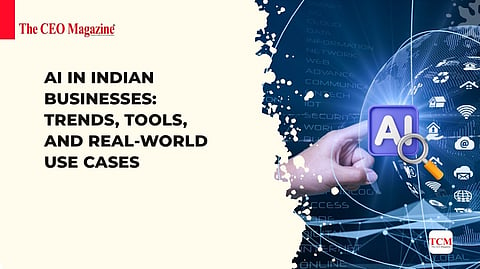
- News
- Women
- Magazine
- IndustryIndustry
- InsightsInsights
- Success Stories
- PublishPublish
- ContactContact
- Media KitMedia Kit

Let’s start with a simple truth:
AI is no longer optional — it’s essential.
If you're a CEO, founder, or decision-maker in India right now, you're probably asking yourself:
“How can my business leverage AI before it’s too late?”
Well, you're not alone.
From local MSMEs in Surat to billion-dollar conglomerates in Mumbai, Indian businesses are diving into AI-driven transformation — and the results are nothing short of remarkable.
In this guide, I’m going to walk you through:
The key AI trends shaping India’s business landscape
The must-have tools you should know
And real-world use cases proving AI isn’t just hype — it’s here, and it’s profitable.
Let’s decode the future — together.
AI in Indian businesses is accelerating rapidly.
According to a 2024 Nasscom report, over 70% of Indian enterprises have either adopted or are actively piloting AI initiatives.
From predictive analytics in retail to generative AI in content marketing, the impact spans every sector.
“AI is the new electricity. Just as electricity transformed every major industry, AI will do the same.” — Andrew Ng
But how do you navigate this transformation?
It starts with understanding where the current is flowing.
In sectors like e-commerce, fintech, and edtech, businesses are leveraging AI to deliver tailored experiences.
Real-world example:
Edtech leaders like BYJU’S and Unacademy use AI to adapt content based on a student’s pace, performance, and preferences.
What started with ChatGPT is now exploding across industries.
Businesses are using generative AI to create:
Product descriptions
Marketing copy
Legal contracts
Customer support scripts
In my experience, generative AI can cut content production time by 70–80% — that’s not just efficient, it’s a strategic advantage.
From logistics to HR, AI models are helping companies forecast trends, employee churn, and even equipment failure — saving lakhs in preventive actions.
With India’s linguistic diversity, AI-powered voice bots and NLP tools in Hindi, Tamil, Bengali, and more are enabling deeper customer engagement across Bharat.
Think about this:
If your target market includes Tier 2 and Tier 3 cities, vernacular AI is your ticket to trust and growth.
Let me share some of the AI tools Indian businesses are adopting (and that you should explore too):
Yellow.ai, Haptik, and TARS are popular in India for automating customer support.
Many startups are integrating WhatsApp chatbots with AI logic to enhance user experience and sales.
Writesonic and Jasper are being used to write ad copies, emails, and blogs in seconds.
HubSpot AI and Zoho CRM AI are helping teams close more deals with smarter insights.
Tableau, Power BI, and Google Looker now embed predictive AI to anticipate trends.
Local logistics startups use AI tools for real-time route optimization and fleet efficiency.
Tools like Runway ML, Lumen5, and Canva AI are empowering even non-designers to create professional assets.
Want to stay competitive? Start small. Test fast. Scale what works.
Let me show you how AI is already transforming Indian companies:
ICICI Bank uses AI for fraud detection, loan risk assessments, and chat-based customer queries — reducing human load by over 40%.
Nykaa and Myntra use AI to power personalized product recommendations and dynamic pricing — boosting AOV and retention.
Mahindra & Mahindra has implemented AI for predictive maintenance and smart inventory management, cutting downtime by 30%.
Tata Neu uses AI for 24/7 multilingual virtual assistants, enhancing satisfaction across India’s diverse demographic.
“AI won’t replace people — but people using AI will replace those who don’t.”
Let me ask you:
Is your team spending too much time on repetitive tasks?
Do you struggle to personalise your customer journey at scale?
Are your decisions more reactive than predictive?
If you said “yes” to even one, AI could be your next competitive advantage.
Here’s a 3-step playbook I recommend to founders and CEOs:
Start by automating low-hanging fruit like:
Email follow-ups
Support ticket replies
Lead scoring
Don’t aim for AI transformation on Day 1.
Pick one department — marketing, sales, or HR — and test tools in a sandbox environment.
AI is only as effective as the people using it.
Encourage internal training or partner with edtechs like Scaler, UpGrad, or Simplilearn for AI skilling.
According to Accenture, AI has the potential to add $957 billion to India’s economy by 2035.
But the opportunity isn’t just national — it’s personal.
The earlier your business adapts, the wider the moat you build around it.
So, whether you’re running a 5-person startup or a 5000-employee enterprise — now is the time to prepare, pilot, and profit from AI.
Here’s the secret:
You don’t have to be an AI expert to lead an AI-powered business.
You just need the mindset to explore, the curiosity to learn, and the courage to experiment.
“The best way to predict the future is to create it.” — Peter Drucker
And with AI, you’re not just predicting the future of business — you’re building it.
Did this guide spark ideas for your business?
Share it with your leadership team or co-founders.
Subscribe to The CEO Magazine India for weekly insights on innovation, strategy, and growth.
Follow us on Google News
